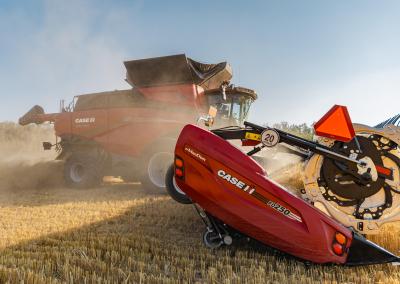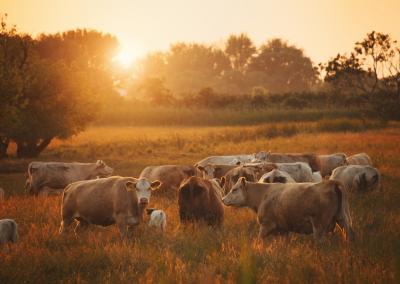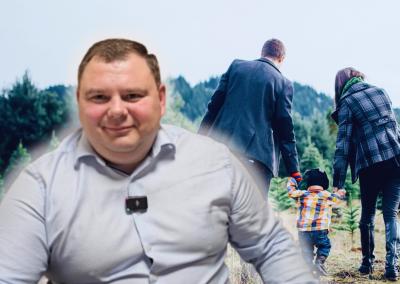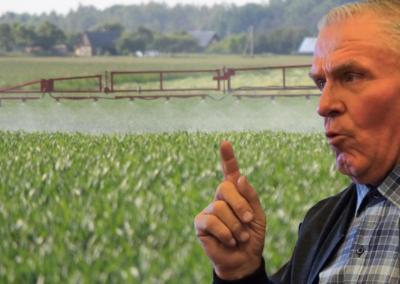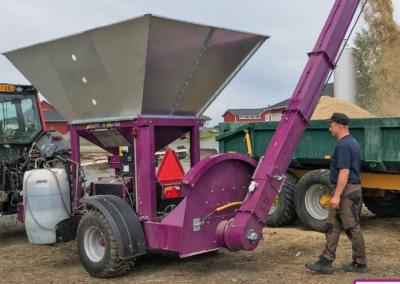"Biolectric's biogas plant on a dairy farm is a unique step towards sustainability (VIDEO)
Farmer Arūnas Lipavičius from the village of Kiškėnai (Klaipėda district) has actually implemented a closed-loop chain on his farm. It recycles all the liquid manure and feed residues generated on the farm, thus reducing the cost of milk production and beef cattle rearing.
In the space of about one year, UAB „interAG“ installed not only a manure separator from the Austrian company BAUER between the two slurry lagoons, but also a biogas plant from the Belgian company „Biolectric“, which generates about 1,000 kilowatts of electricity and heat per day.
„We have a segregated fraction with which we can load the beds. We get electricity, we get heat“, – lists the benefits of the "Biolectric" biogas plant and the BAUER separator, adding that the farm has practically got rid of unpleasant smells that used to make neighbours uncomfortable. After all, the Klaipėda district is one of the fastest growing areas. This was confirmed by Bronius Markauskas, the Mayor of Klaipėda, who visited the opening of the "Biolectric" biogas plant, and who also used to be a farmer. Like Lipavičius, the current mayor used to run a dairy farm.
When asked how much investment was required to install the „Biolectric“ biogas plant and BAUER separator, Mr Lipavičius said with a smile that it was a lot, but that it would take about 5 years to pay off the investment.
The farmer also admits that with over 200 dairy cows and some beef cattle, such a project would be too expensive for the farm without European Union support. This time the intensity of the support was 65%, so the farmer had no problem realising his dream.
According to Ugnius Stančiauskas, Director of UAB „interAG“, it is now very favourable to build biogas plants, as the intensity of support ranges from 50% to 85%.
„I always like to do things not with words, not with stories, but with deeds. I invite people to come and see how it works all the time," says U. Stančiauskas.
The Belgian-built „Biolectric“ biogas plant is fully automated. The farmer can even control it with a mobile phone or tablet.
„It can be switched on and off at any time, and the excess electricity can be stored in ESO's grid, as well as taken from ESO when electricity is needed, for example, for grain dryers or for the production of compound feeds, where the electricity consumption is very high, “, – the advantages of the system, says U. Stančiauskas.
Interestingly, Lipavičius is also a member of the agricultural cooperative „Pienas LT“, so the cooperative also contributed to bringing the biogas plant and separator project to the farm. It is also positive that the current Minister of Agriculture, Kazys Starkevičius, has promised to make it easier for small and medium-sized farmers to get support.
„If there are no such farmers left, we will still have a milk supply, but in that case only mega-farms will remain in Lithuania. We need to encourage such projects fully," Starkevičius said at the opening ceremony.
There are over 400 „Biolectric“ biogas plants installed in Europe, and over a hundred in neighbouring Poland alone –. These plants range in capacity from 11 to 74 kW.
Another "Biolectric" biogas plant has been built by another Klaipėda district farmer, Roman Liaudanskas.
For more information about „Biolectric“ biogas plants, you can contact the only official representative of „Biolectric“ in Lithuania, UAB „interAG“, by email info@interag.lt, by phone +370 672 82677 or by visiting the website https://www.interag.lt/biolectric
For more on the opening of the „Biolectric“ biogas plant, see this „Agrobite play“ report.





























